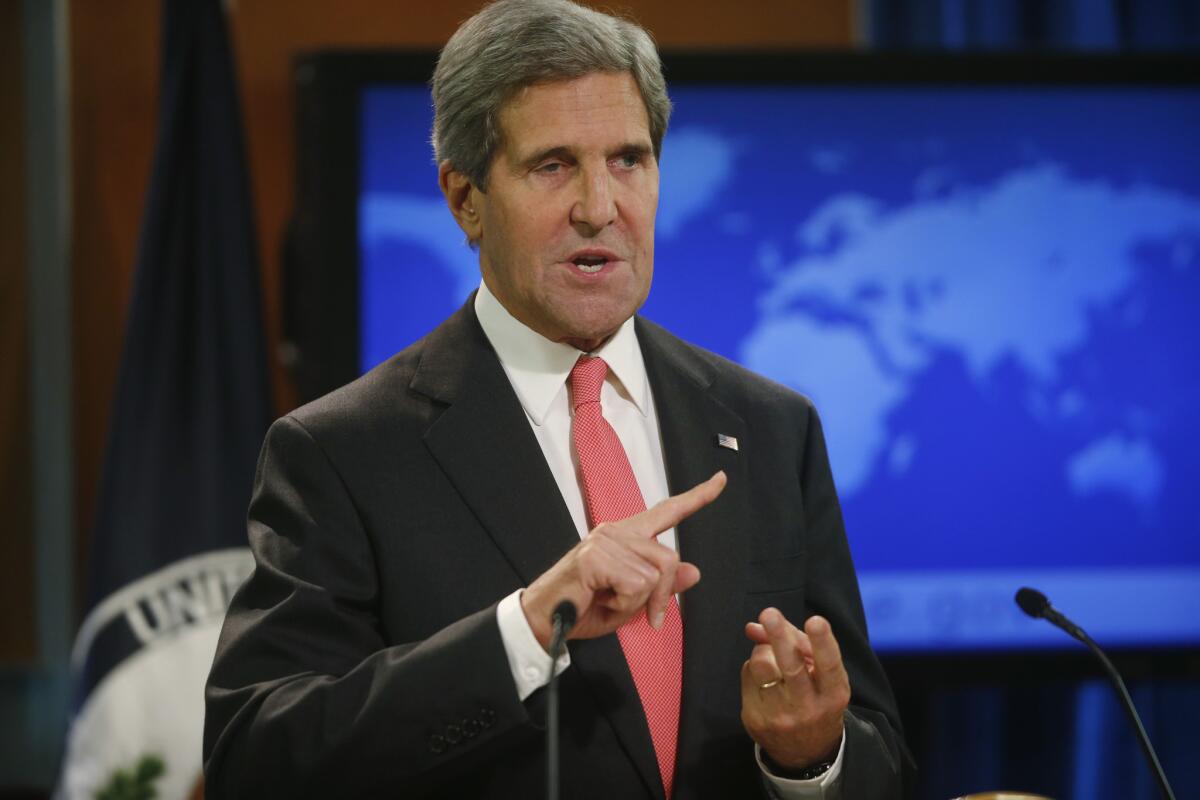Kerry belittles Russian suggestion that Syrian rebels used sarin

WASHINGTON – Secretary of State John F. Kerry on Thursday raised pressure on Russia to help resolve the crisis in Syria, forcefully rejecting Moscow’s claim that Syrian rebels were behind last month’s chemical weapons attack in several Damascus suburbs.
Ahead of a much anticipated meeting of the U.N. General Assembly in New York next week, Kerry said a report by U.N. weapons inspectors released this week showed “unequivocally” that deadly sarin nerve gas was used in the attack, and that only President Bashar Assad’s government could have been responsible.
“We really don’t have time today to pretend that anyone can have their own set of facts approaching the issue of chemical weapons in Syria,” Kerry said in brief remarks at the State Department.
Earlier Thursday, Russian President Vladimir Putin, speaking at a conference in the northwestern Russian city of Valday, reiterated his position that although “the U.N. inspectors report made it clear that chemical weapons were used … it is not clear who did that.”
Kerry scoffed at the claim, which included speculation that the rebels were to blame for the sarin attack.
“The world can decide whether it was used by the regime, which has used chemical weapons before, the regime which had the rockets and the weapons, or whether the opposition secretly went unnoticed into territory they don’t control to fire rockets they don’t have, containing sarin that they don’t possess to kill their own people,” he said.
“And that, without even being noticed, they just disassembled it all and packed up and got out of the center of Damascus controlled by Assad,” he said. “Please.”
U.S. officials have linked one of the munitions identified by U.N. inspectors – a 122-millimeter improvised rocket – with previous attacks carried out by Assad’s forces, Kerry said. Rebel forces don’t possess that type of rocket and have never used it in an attack, nor is there “a shred of evidence” that the opposition has sarin, he said.
The rift between Moscow and Washington has widened since Saturday, when Kerry and his counterpart, Foreign Minister Sergei Lavrov, agreed on an ambitious timeline to rid Syria of its chemical weapons by mid-2014. U.S. officials have begun to signal that Assad will not meet a deadline of this Saturday to submit an inventory of his toxic stockpiles and facilities to international inspectors, the first benchmark in the plan.
Russia has also blocked U.S. efforts to pass a resolution in the U.N. Security Council that would automatically authorize punitive measures, perhaps including military action, if Syria doesn’t comply with the plan.
Kerry on Thursday tried to renew the threat of unilateral U.S. military action if Syria doesn’t disarm, although such a move is considered unlikely because of opposition in Congress and among the American public.
“We have to recognize that the world is watching to see whether we can avert military action and achieve through peaceful means even more than what those military strikes promised,” Kerry said.
ALSO:
Egyptian forces clash with militants near Cairo
Pope takes issue with church’s focus on gays, abortion
Al Qaeda-linked group seizes Syrian town from main rebel army
Twitter: @SBengali
Times staff writer Sergei L. Loiko in Valday contributed to this report.
More to Read
Sign up for Essential California
The most important California stories and recommendations in your inbox every morning.
You may occasionally receive promotional content from the Los Angeles Times.










